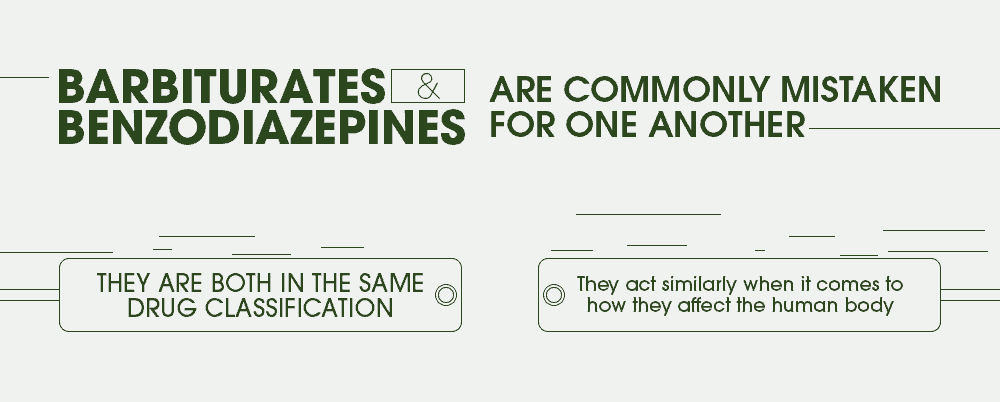Benzodiazepines and barbiturates are two different types of drugs, both of which are used to treat anxiety, insomnia, and other conditions. While they are both classified as sedatives, they have distinct differences in chemical makeup and the way they affect the body. This article will discuss the similarities and differences between benzodiazepines and barbiturates, as well as the potential risks associated with each.
Benzodiazepines and barbiturates have been used for centuries to treat a variety of medical conditions. While both drugs are sedative-hypnotics, they are not identical. Benzodiazepines are a type of tranquilizer that acts on the central nervous system, while barbiturates are a type of sleeping pill that works on the brain and the body. Each drug has its own unique set of effects, side effects, and risks, which will be discussed in greater detail. Ultimately, it is important to understand the similarities and differences between benzodiazepines and barbiturates in order to make an informed decision about which is the best option for you.
No, Benzodiazepine is not a Barbiturate. Benzodiazepine is a class of drugs that act on the central nervous system and affect chemicals in the brain that may be unbalanced in people with anxiety. Barbiturates are a different class of drugs which act on the nervous system to produce a calming effect. They are considered to be more powerful than benzodiazepines and have a higher potential for abuse and addiction. Barbiturates are not commonly used for treating anxiety, as they are typically used for treating severe insomnia, seizures, and anesthesia.

Contents
Is Benzodiazepine a Barbiturate?
Benzodiazepines and barbiturates are both central nervous system (CNS) depressants, meaning they can slow down brain activity and reduce anxiety or stress. They both have sedative effects and can be used to treat anxiety, insomnia, and seizure disorders. However, there are important differences between the two classes of drugs.
What is a Benzodiazepine?
Benzodiazepines are a class of drugs that act on the brain and central nervous system to produce a calming effect. Common benzodiazepines include lorazepam (Ativan), alprazolam (Xanax), and diazepam (Valium). These drugs work by increasing the activity of the neurotransmitter gamma-aminobutyric acid (GABA), which helps regulate nerve cell activity in the brain. Benzodiazepines are typically used to treat anxiety, insomnia, and seizures, as well as for alcohol withdrawal. They can also be used for muscle relaxation and as premedication before surgery.
What is a Barbiturate?
Barbiturates are a class of drugs that act on the brain and central nervous system to produce a calming effect. These drugs work by decreasing the activity of the neurotransmitter gamma-aminobutyric acid (GABA), which helps regulate nerve cell activity in the brain. Barbiturates are typically used to treat anxiety, insomnia, and seizures, as well as for alcohol withdrawal. They can also be used as sedatives, anticonvulsants, and anesthetics. Common barbiturates include phenobarbital, pentobarbital (Nembutal), and secobarbital (Seconal).
Difference Between Benzodiazepines and Barbiturates
The main difference between benzodiazepines and barbiturates is the duration of action. Benzodiazepines have a shorter duration of action, which means they work quickly and their effects last for a shorter period of time. Barbiturates have a longer duration of action, which means they take longer to take effect but their effects last for a longer period of time.
Benzodiazepines are generally considered to be safer than barbiturates, as they have fewer side effects and a lower risk of addiction. However, both classes of drugs can be habit-forming and should only be taken as prescribed by a doctor. In addition, both classes of drugs can cause respiratory depression and should be used with caution in elderly patients and those with compromised respiratory function.
Frequently Asked Questions About Benzodiazepine and Barbiturate
Benzodiazepine and barbiturates are two different types of medications used to treat anxiety and other medical conditions. While both belong to the same class of sedative drugs, they have distinct characteristics and effects on the body. This article will answer the most common questions about benzodiazepine and barbiturate.
What is Benzodiazepine?
Benzodiazepine is a type of sedative drug commonly used to treat anxiety and insomnia. It is a depressant drug that works by increasing the activity of the neurotransmitter gamma-aminobutyric acid (GABA). This action helps to reduce the activity of the brain and produces a calming effect. Commonly prescribed benzodiazepines include Xanax, Valium, and Ativan.
What is Barbiturate?
Barbiturates are another type of sedative drug that is used to treat anxiety and insomnia. They work by binding to the same receptors as benzodiazepines, but they are much more potent and have a higher risk of addiction. Commonly prescribed barbiturates include Nembutal and Seconal.
Is Benzodiazepine a Barbiturate?
No, benzodiazepine is not a barbiturate. Both are sedative drugs, but they work differently and have different effects on the body. Benzodiazepines work by increasing the activity of the neurotransmitter GABA, while barbiturates bind to the same receptors as benzodiazepines but are much more potent.
What are the Side Effects of Benzodiazepines?
The most common side effects of benzodiazepines include drowsiness, dizziness, confusion, and impaired coordination. Other side effects may include nausea, headache, and blurred vision. Long-term use of benzodiazepines can lead to physical dependence and addiction.
What are the Side Effects of Barbiturates?
The most common side effects of barbiturates include drowsiness, confusion, impaired coordination, and shallow breathing. Other side effects may include nausea, headache, and blurred vision. Long-term use of barbiturates can lead to physical dependence and addiction. Barbiturates also have a higher risk of overdose than benzodiazepines.
Barbiturates and Benzodiazepines
In conclusion, benzodiazepine is not a barbiturate. Although they are both sedatives, they work differently and have different effects on the body. Barbiturates are usually prescribed to treat anxiety, seizures, and insomnia, while benzodiazepines are prescribed for anxiety, muscle spasms, and sleep disorders. Barbiturates can be habit-forming and highly addictive, whereas benzodiazepines are less habit-forming and have fewer side effects. It is important to remember that both of these medications can be dangerous when misused, and should only be taken under the supervision of a doctor.
